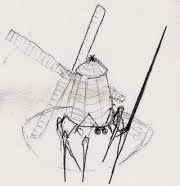Most boycotts these days seem to have little effect.
After all, the eponymous event was a 'powerless local many' versus the 'locally powerful few', rather than the 'small socially conscious' vs the 'powerful, global few' which is today's version. The Peoples Republic of China, for instance, may be a festering hell, but we can't convince enough people to stop purchasing their trade goods to actually make an impact.*
At best, a small percentage of our population will function as Conscientious Objectors, and in the end have as little impact as Conscientious Objectors ever have.
So lets consider a possible leverage.
Trade goods are not bought and sold overnight. The backbone of global trade is the humble steel containers, stacked on cargo ships crawling across the oceans: 5152 vessels devoted to containers alone. (Another 16,000 'general cargo' ships are also registered.)
The number of containers isn't really tracked, but its something on the order of 20,000,000 units at any time.
To fill, move and unload these containers take time.
The ocean crossing (Hong Kong to North America) takes about 20 days. Add five days at each side to clear customs and get off the docks. Another couple of days in transit to warehouse, and then an unknown warehouse period until it reaches the actual retail shelves.
The delay is interesting, because this means product is ordered for sales in the future. One to three months, depending on the product.
Feedback is an really cool thing, especially when its being manipulated. In this case, we want negative feedback. The trick is to embargo goods briefly, in short periods, at a frequency that interferes with the purchase-ship-sell-next purchase based on sales loop.
I am calling this the 90-Day Punch.
Stop buying a product for 90 days. That is not too hard. Anybody can defer the pleasure of consumption for a little while.
Then relax for a month or so. Don't stockpile, but enjoy your purchasing. Its important to not buy enough to make up for the last 90 days: one of the advantages here is that this is acting like skipping junk food. Good for wallet and waistline alike!
Not to mention with the money saved, you should be able to easily afford the more expensive goods from local manufacturers and trusted trading partners.
Then do it again!
And again!
Again!
Its just like rocking a canoe: sooner or later the water comes over the side.
Orders drop as retail sales slide in a given quarter. Credit notes come due: factories note the falling sales and scale back production. Perhaps they try to diversify, which absorbs capital and interferes with procedures and schedules. Funds are pumped in to stabilize the situation, but the Cold Hand of Failure claws away the weaker companies.
PRC wage-slaves, already unhappy, edge closer to the boiling point of revolution as jobs are lost and the promise of good things fade.**
The weakness of the PRC economy is its control structure. By grafting capitalist decision-trees onto the fundamental top-down Marxist economy, they have avoided the ponderous shortfalls of the Soviet Union, but they still can't flex fast enough when faced with a grassroots economic modification.
Think about it: if our Governments tried an embargo, they would merely trigger a trade war and be forced to back down. But if we just institute stop-and-go buying, there is an excellent chance that this would work with a very small percentage of the population behind it.
How small? Ten percent? Twenty? Five?
I would have liked to close this by a Mao Zedong quote, but unfortunately, he is best summed up by his remark that reading too many books was harmful.
*Trite argument: if the Soviet Union was defeated by Capitalism, Capitalism stands close to being defeated by Consumerist Marxism.
**Governments never fall when things are good. This should be obvious to anyone in British politics, and a warning to the house-carls of the King in Orange.


No comments:
Post a Comment